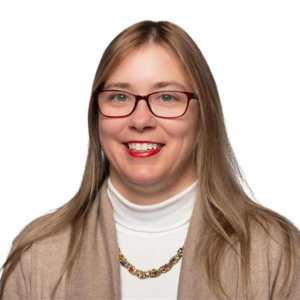Sean Howard
Adjunct Professor
Department: L'nu, Political and Social Studies
Email: Sean_Howard@cbu.ca
At Cape Breton University, we recognize the critical importance of disability rights in shaping a more inclusive, peaceful, and just world. The intersection of disability rights and disarmament is a crucial yet often overlooked area in global security discussions.
In October 2024, a historic Joint Civil Society Statement on Disability and Disarmament was delivered at the UN First Committee on Disarmament and International Security by leading experts, including two of our own professors, Dr. Sean Howard and Dr. Tammy Bernasky. This groundbreaking statement calls for the full inclusion of persons with disabilities in disarmament processes, emphasizing that they are not victims to be assisted, but leaders in the quest for peace.
The statement underscores the need for disability inclusion in disarmament dialogues, aligning with the principles of the Convention on the Rights of Persons with Disabilities (CRPD), which views persons with disabilities as agents of change, not as passive recipients of aid. It highlights the disproportionate impact that armed conflict has on persons with disabilities and urges the global community to include their voices in efforts to dismantle the systems and weapons of violence that threaten global security.
Through our involvement in this important movement, Cape Breton University is committed to raising awareness, advancing research, and promoting advocacy for the inclusion of disability rights in international security and disarmament discussions. This initiative serves as a call to action, urging decision-makers worldwide to recognize the leadership and valuable contributions of persons with disabilities in shaping a more peaceful and accessible world.
At a side event on October 29, 2024, Dr. Tammy Bernasky played a significant role by summarizing the Joint Civil Society Statement on Disability and Disarmament (p. 39). She emphasized the need to recognize persons with disabilities as rights-holders who can meaningfully contribute to disarmament efforts. Dr. Bernasky advocated for integrating disability considerations into existing resolutions and introducing a new resolution focused on disability, disarmament, and non-proliferation. This session underlined the importance of including disability in disarmament discussions to counter the marginalization of people with disabilities in policymaking, particularly in international forums like the First Committee. The event was a critical step in building momentum for future efforts to elevate disability rights in disarmament diplomacy.
Dr. Howard & Dr. Bernasky reviewed the session to assess and highlight the current state of disability inclusion within disarmament discussions at the UN First Committee. They aimed to identify gaps where disability considerations were either missing or insufficiently addressed, and to advocate for stronger integration of disability rights into disarmament processes. You can read Dr. Howard and Dr. Bernasky’s review here on page 42.
By reviewing the session, they were able to spot opportunities for advocacy, analyze the impact of existing resolutions, and emphasize the need for more comprehensive approaches that recognize persons with disabilities as active participants in shaping disarmament outcomes. Their review helped to push for a paradigm shift—from viewing disability as a mere humanitarian issue to framing it within the context of human rights and agency, thus ensuring that disability inclusion becomes a central and permanent aspect of future disarmament diplomacy.
Dr. Howard & Dr. Bernasky contributed a Working Paper to the Third Meeting of States Parties to the United Nations Treaty on the Prohibition of Nuclear Weapons (TPNW), held in New York on March 3-7. Adopted by 122 states in 2017, and in force since January 2021, the TPNW is a humanitarian disarmament treaty containing a number of ‘positive obligations’ on victim assistance, environmental remediation, and international cooperation to combat the multiple, grievous impacts and legacies of nuclear use and testing. You can read the paper entitled Alignment and Alliance: Disability Rights in the Implementation and Review of the TPNW here. The Working Paper argues that the process of fulfilling these obligations, and furthering the TPNW’s other main goals, must be as disability-inclusive and -responsive as possible, linking assistance to agency in line with the CRPD.
A summary of the Working Paper can be read on pages 45-46 of this edition of Reaching Critical Will’s Nuclear Ban Daily. In their conclusion – ‘Broadening Our Base, Making Our Case’ – Drs. Howard and Bernasky argue that mainstreaming disability rights “will enable the TPNW community to be further enriched and diversified,” raising “global consciousness of nuclear legacies, realities, and dangers” too be “raised in ways rendering the case for abolition – and, thus, the treaty – more compelling. Given the daunting distance to our ultimate goal – a nuclear-weapon-free world of cooperative” They stress, however, that such mainstreaming is fundamentally “not a question of strategy but respecting human rights enshrined in international law.”
Dr. Howard and Dr. Bernasky also contributed an article to Reaching Critical Will’s NPT News in Review on April 24. Published in advance of a crucial meeting of the Preparatory Committee (PrepCom) of the nuclear Non-Proliferation Treaty in New York (April 28-May 9), their piece – ‘The Non-Proliferation of Prejudice: Disability Rights in the New NPT Era’ – concludes by arguing that, at a time when “disability rights are under ferocious attack” in many countries and quarters, “it is high time to make the vital connection between the non-proliferation of weapons that threaten all humanity and the non-proliferation of prejudice against such an important part of the human family”. You can read the full piece on pages 10 and 11 of NPT News in Review (NIR20.1.pdf).
JOIN OUR MOVEMENT
The Joint Civil Society Statement on Disability and Disarmament is endorsed by:
Endorsing Organizations
Individual Endorsements
Department: L'nu, Political and Social Studies
Email: Sean_Howard@cbu.ca

Department: L'nu, Political and Social Studies
Email: Tammy_Bernasky@cbu.ca
Office: CC237